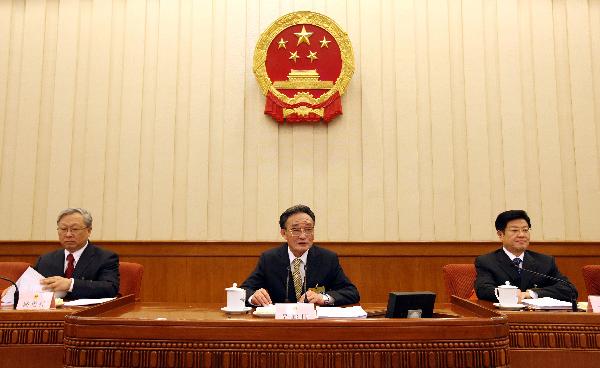Compensation for prolonged detention specified
 |
|
Wu Bangguo (C), chairman of the Standing Committee of the National People's Congress, China's top legislature, addresses the first plenary meeting of the 14th session of the Standing Committee of the 11th National People's Congress (NPC), in Beijing, capital of China, on April 26, 2010. [Xinhua] |
Suspected criminals found innocent or those whose cases prosecutors drop after excessive long periods of detention should be compensated by the state, according to a law amendment discussed by lawmakers Monday.
The draft amendments to the State Compensation Law were submitted for their fourth reading to a four-day session of the National People's Congress (NPC) Standing Committee, or the top legislature.
According to the Criminal Procedure Law, police can detain those committing crimes or suspected of crimes.
The Criminal Procedure Law says police should limit detention to three days and bring cases to prosecutors within those three days.
The period could be prolonged by one to four days "in special cases," and to a maximum of 30 days for extremely serious crimes.
Members of the NPC Standing Committee say the draft amendments should explicitly stipulate that those who have been detained illegally are entitled to compensation. Those who have been detained beyond the legally permitted period should be entitled to state compensation, the members said.
Hong Hu, vice chairman of the NPC Law Committee, briefed lawmakers on the draft amendments.
According to the NPC, the amendments aim to better defend people's rights from being violated by the State.
It is hoped the amendments will enhance protection of detainees' rights.
The current law took effect in 1995.
State laws or amendments usually go through at least three readings before being adopted by China's top legislature.
Top legislator Wu Bangguo presided over the session which opened Monday.
 0
0 







Go to Forum >>0 Comments